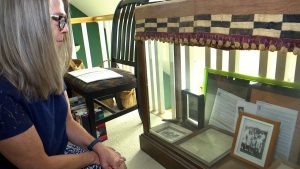An increase in mask-wearing in a community is linked to better control over COVID-19 transmission, according to a new study published in The Lancet Digital Health journal Tuesday morning.
The study, done by researchers at Boston Children’s Hospital, surveyed more than 300,000 Americans about their mask habits over the summer, making it one of the only studies to look at masks’ effectiveness across the entire United States.
Researchers found that a 10% increase in mask-wearing by people within a zip code tripled the chances that the community also kept transmission rates low, therefore reducing spread.
The study found that, as a whole, places with high rates of mask-wearing and social distancing were the most likely to reduce virus spread.
Bur researchers also showed that mask-wearing across an entire community is key — not just by a few individuals or those are infected.
“The evidence is clear: masks work,” said Dr. Hannah Clapham of the National University of Singapore, who wrote an article commenting on the study. “However, their use is a non-targeted control measure, wherein the whole population is involved, rather than just known or suspected cases.”
“Buy-in from society as a whole is therefore necessary for the success of the intervention,” she added.
The study relied on a survey in which Americans self-reported their mask-wearing habits, which is one limitation of the data.
Other limitations of the study include the fact that researchers didn’t factor in contact tracing, testing or other measures that could have slowed the spread in communities with high rates of mask-wearing.
Still, the survey showed that nearly 85% of people said they’re “very likely” to wear a face mask in a grocery store, while about 40% said they wore one to visit family and friends.
People over 65 were more likely to say they wear a mask, and Black and Hispanic Americans were more likely to report mask-wearing than white people.
“The world is facing a more transmissible coronavirus strain, hospitals are struggling with new cases, and vaccination programs are still being rolled out. Interventions are needed now to lower the burden on our healthcare systems,” said co-author Dr. Christina Astley, an epidemiologist with Boston Children’s Hospital and Harvard Medical School.
“This research provides additional evidence that those interventions should include wearing face masks to protect ourselves and as well as physical distancing,” Dr. Astley added.
The study’s authors also found that mask mandates led to an increase in mask-wearing, but more people began to wear masks even in places without a mandate. Senior author Dr. John Brownstein of Boston Children’s Hospital noted the need for more research into other reasons communities might adopt mask-wearing.
“Our findings, based on observational data, suggest a community benefit for wearing face masks,” Brownstein said. “However, mandates alone may not be enough to increase mask use. We recommend that policy-makers consider additional strategies to evaluate and increase mask usage in order to disrupt the ongoing COVID-19 epidemic.”
As of Jan. 19, the majority of states have a mask mandate in place.
In one of his first official acts upon becoming president on Jan. 20, President-elect Joe Biden has said he would challenge all Americans to wear masks for 100 days.




